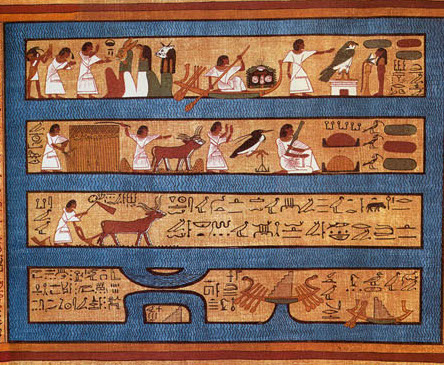Aaru on:
[Wikipedia]
[Google]
[Amazon]
__NOTOC__
In ancient  The ancient Egyptians believed that the soul resides in the heart and so, upon death, the
The ancient Egyptians believed that the soul resides in the heart and so, upon death, the
Egyptian mythology
Egyptian mythology is the collection of myths from ancient Egypt, which describe the actions of the Egyptian gods as a means of understanding the world around them. The beliefs that these myths express are an important part of ancient Egyp ...
, Aaru (; egy, jꜣrw "Reeds, rushes"), known also as '' sḫt-jꜣrw'' or the Field of Reeds, is the heavenly paradise
In religion, paradise is a place of exceptional happiness and delight. Paradisiacal notions are often laden with pastoral imagery, and may be cosmogonical or eschatological or both, often compared to the miseries of human civilization: in parad ...
where Osiris
Osiris (, from Egyptian ''wsjr'', cop, ⲟⲩⲥⲓⲣⲉ , ; Phoenician: 𐤀𐤎𐤓, romanized: ʾsr) is the god of fertility, agriculture, the afterlife, the dead, resurrection, life, and vegetation in ancient Egyptian religion. He wa ...
rules. It has been described as the '' ka'' (a part of the soul
In many religious and philosophical traditions, there is a belief that a soul is "the immaterial aspect or essence of a human being".
Etymology
The Modern English noun '' soul'' is derived from Old English ''sāwol, sāwel''. The earliest atte ...
) of the Nile Delta.
 The ancient Egyptians believed that the soul resides in the heart and so, upon death, the
The ancient Egyptians believed that the soul resides in the heart and so, upon death, the Weighing of the Heart
Ancient Egyptian afterlife beliefs were centered around a variety of complex rituals that were influenced by many aspects of Egyptian culture. Religion was a major contributor, since it was an important social practice that bound all Egyptians t ...
occurred. Each human heart is weighed on a giant scale against an ostrich feather, which represents the concept of Maat
Maat or Maʽat ( Egyptian:
mꜣꜥt /ˈmuʀʕat/, Coptic: ⲙⲉⲓ) refers to the ancient Egyptian concepts of truth, balance, order, harmony, law, morality, and justice. Ma'at was also the goddess who personified these concepts, and regul ...
. Those souls which balance the scales are allowed to start a long and perilous journey to the Field of Reeds, where they will exist in pleasure for all eternity. Hearts heavy with evil tip and fall into the crocodilian jaws of the demon Ammit
Ammit (; egy, ꜥm-mwt, "devourer of the dead";Erman, Adolf; Grapow, Hermann (1926-1961) ''Wörterbuch der ägyptischen Sprache'', Berlin: Akademie-Verlag, volume 1, page 184.9 also rendered Ammut or Ahemait) was a goddess in ancient Egyptian ...
. After this "second death", the soul is doomed to restlessness in Duat
The Duat ( egy, dwꜣt, Egyptological pronunciation "do-aht", cop, ⲧⲏ, also appearing as ''Tuat'', ''Tuaut'' or ''Akert'', ''Amenthes'', ''Amenti'', or ''Neter-khertet'') is the realm of the dead in ancient Egyptian mythology. It has been ...
.
The souls who qualify undergo a long journey and face many perils before reaching Aaru. Once they arrive, they enter through a series of gates. The exact number of gates varies according to sources; some say 15, some 21. They are uniformly described as guarded by evil demons armed with knives.
Aaru usually was placed in the east where the Sun rises and described as boundless reed fields, like those of the earthly Nile Delta. This ideal hunting and farming ground allowed the souls here to live for eternity. More precisely, Aaru was envisaged as a series of islands covered in fields of rushes. The part where Osiris later dwelt is sometimes known as the "field of offerings", ''sḫt-ḥtpt'' in Egyptian.
See also
* Heaven * Elysium *Valhalla
In Norse mythology Valhalla (;) is the anglicised name for non, Valhǫll ("hall of the slain").Orchard (1997:171–172) It is described as a majestic hall located in Asgard and presided over by the god Odin. Half of those who die in combat e ...
* Paradise
In religion, paradise is a place of exceptional happiness and delight. Paradisiacal notions are often laden with pastoral imagery, and may be cosmogonical or eschatological or both, often compared to the miseries of human civilization: in parad ...
* Nirvana
( , , ; sa, निर्वाण} ''nirvāṇa'' ; Pali: ''nibbāna''; Prakrit: ''ṇivvāṇa''; literally, "blown out", as in an oil lampRichard Gombrich, ''Theravada Buddhism: A Social History from Ancient Benāres to Modern Colombo.' ...
(Nirvana (Buddhism)
Nirvana (Sanskrit: निर्वाण, '; Pali: ') is "blowing out" or "quenching" of the activities of the worldly mind and its related suffering. Nirvana is the goal of the Hinayana and Theravada Buddhist paths, and marks the soteriologica ...
)
* Neorxnawang
* Ashihara no Nakatsukuni of Japan
References
Citations
Bibliography
* *Jobes, Gertrude. ''Dictionary of Mythology, Folklore, and Stymbols'', Part 1. New York:The Scarecrow Press, 1962. Book of the Dead Conceptions of heaven Locations in Egyptian mythology Osiris Nile Delta {{Egypt-myth-stub